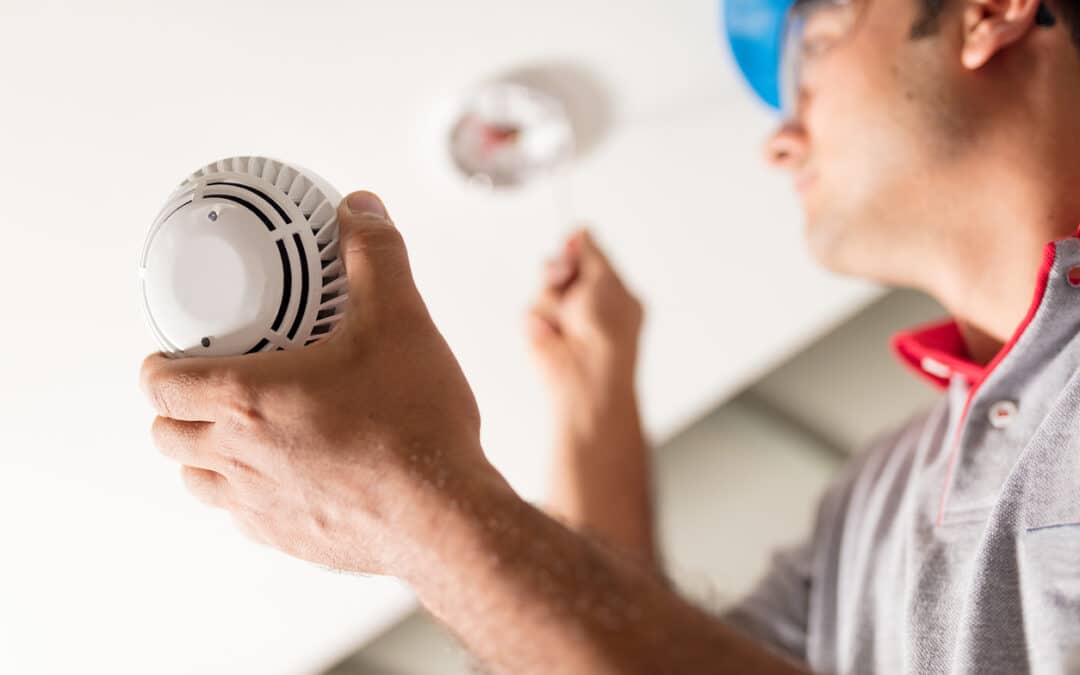Choosing the right smoke detector for your home can actively combat potential fire hazards, preventing damages that could cost thousands of dollars. Selecting the best smoke detector becomes challenging when determining the ideal option to safeguard your home. However, you can easily find the best smoke detector for home by assessing its pros and cons to determine the recommended smoke alarms for your home’s safety.
Different Types of Smoke Detectors
You can acquire three types of smoke detectors with unique features for identifying fires in your home. Each of these smoke detectors has benefits and will respond differently depending on the fire you are dealing with. Understanding the difference in smoke detectors and comparing their responses is crucial before installation.
Ionization smoke detectors
Ionization smoke detectors, common in offices and homes, swiftly detect fires, warning nearby individuals as flames spread in rooms. When sensors detect ions from flaming fires, alarms activate, providing ample time to address issues. These detectors excel against fast, spontaneous fires that rapidly engulf properties, making them a popular primary choice.
Pros and Cons of Ionization Smoke Detectors
Pros of Ionization Smoke Detectors:
- Responsive to smoke particles from various flammable materials.
- Affordable compared to other types of smoke detectors.
- Safe for home use due to small amounts of radioactive material (Americium-241).
Cons of Ionization Smoke Detectors:
- Less effective at detecting slow, smoldering fires.
- Prone to false alarms triggered by burnt food or steam in the environment.
Ionization smoke detectors efficiently detect smoke particles from combustion, especially from household materials like cleaning products and furniture. Their affordability and safe radioactive material make them popular. However, they struggle with slow, smoldering fires and might trigger false alarms from mundane situations like burnt food or steam.
Photoelectric smoke detectors
Photoelectric smoke detectors excel at catching silent smoldering fires caused by faulty wiring or heat exposure to slow-burning materials. It utilizes a photosensitive sensor paired with an infrared LED to detect airborne smoke particles, sounding an alarm to indicate an ongoing fire. Ideal for bedrooms and living rooms, it effectively detects lingering slow fires that remain undetected until it’s too late.
Pros and cons of photoelectric smoke detectors
Pros of Photoelectric Smoke Detectors:
- Higher sensitivity to smoke particles for better fire response.
- Lower likelihood of random activation, reducing false alarms.
- Environmentally friendly due to the absence of radioactive materials.
- Not affected by cooking fumes or kitchen steam, reducing interference.
Cons of Photoelectric Smoke Detectors:
- Higher price compared to other smoke detectors.
- Less effective in detecting flames and fast fires.
Photoelectric smoke detectors offer superior sensitivity to smoke particles, reducing false alarms and enhancing fire response. Their eco-friendliness and immunity to kitchen fumes are added advantages. However, they tend to have a higher market price and must be more adept at detecting immediate threats like flames or rapid fires.
Dual-Sensor Smoke Detectors
The dual-sensor smoke detector integrates ionization and photoelectric technology, offering heightened efficiency in detecting potential fires. It maximizes protection against both fast and smoldering fires at home. This device is widely acclaimed as the ultimate smoke detector for residences, favored by numerous companies and property owners to guard against accidental fires.
Pros and cons of dual-sensor smoke detectors
Pros of Dual-Sensor Smoke Detectors:
- Immediate identification of flames and fast-burning fires through ionization sensors.
- Detection of slow, smoldering fires via photoelectric sensors.
- Alignment with NFPA guidelines promoting the use of both sensor types.
Cons of Dual-Sensor Smoke Detectors:
- Sensitivity to smoke particles near heat sources, potentially leading to false alarms.
Dual-sensor smoke detectors offer comprehensive fire detection by identifying immediate threats (flames, fast-burning fires) and slow, smoldering fires. They adhere to NFPA guidelines advocating for the use of multiple sensor types. However, their sensitivity near heat sources like kitchens might result in occasional false alarms.
Factors to Consider When Choosing Smoke Detectors for Your Home
When deciding which type of smoke detector you want for your home, you need to consider multiple factors that can improve the protection they provide against fires and give you better convenience when using them. These factors can also influence the overall performance of the smoke detector, their price range on various websites, and the level of response they have when a potential fire spreads around your residence.
We highly recommend that you pay attention to these factors every time you get a new smoke detector for your property or replace an old one that is outdated and not working correctly.
Sensor Type
The most important factor you need to consider is the sensor types installed inside the smoke detectors since they will dictate how fast they can identify fires in your home and the range they can cover when scanning for smoke particles.
Power Source
The power source is the second factor you should consider since it can affect the way smoke detectors work in your home and the places inside your home where you can use them without any issues.
The first type of power source for smoke detectors is replaceable batteries, which are extremely easy to use by almost everyone and only require you to swap them every 6-12 months when they eventually show signs of running out of energy. The smoke detectors that use this power source can be installed effortlessly on any roof or surface of your property without any limitations, making it the best choice for people who want more convenience in the short term.
The second type of power source for smoke detectors uses electricity directly from your home. It requires you to manually install it with the help of an experienced handyman/electrician before you can start using it. However, despite being more challenging to install, this power source only requires you to switch batteries sometimes, like the previous option. It will stay working 24/7 without assistance as long as there are no power outages or blackouts on your property.
Smart Features
The smart features in the smoke detectors are another major factor that you should consider since they can significantly increase the level of security in your home by providing detailed information about potential fires and sending them to your phone in real time.
With the help of these smart features, you can have your one or multiple smoke detectors connected to the Wi-Fi network in your home, giving new updates to your smart devices or even cloud-voice services like Alexa about the likelihood of a fire spreading through your residence.
Additionally, smart features on smoke detectors like interconnected alarms can allow people in your home to discover fires happening in other rooms or floors of your property by triggering the alarms near their position when there is a fire somewhere else.
You can also control the best smoke detector for home smart features remotely through an app on your phone that monitors the activity of each device, changes its settings according to your preference, and notifies your family members about potential fires.
However, the smoke detectors that use these smart features usually cost a lot more than the other options available to the public, making it more difficult to acquire them if you don’t have a budget to cover this type of investment.
Ensuring the Best Smoke Detector Works
After you find and acquire the best smoke detector for home, you must immediately test it out and ensure it works properly without any issues to avoid potential accidents in the future.
This process includes all the steps in placement and installation of the smoke detectors, plus all the regular maintenance they require every year to perform at 100% and detect any fires that occur in your house as quickly as possible.
Thankfully, these steps are simple to follow and can be performed by almost everyone with a basic knowledge of home repair tasks. Even if you feel you need more confidence in the placement and installation process, you can ask someone else to do it for you.
Placement and Installation of Smoke Detectors
The placement and installation of the smoke detectors on your property should follow the recommendations and guidelines from the National Fire Protection Association since they can help you improve the detection of fires and prevent accidents before they even happen.
To get the best results, they recommend that you place smoke detectors in places that people frequent the most, including inside all of the bedrooms of your home and outside sleeping areas where everyone tends to rest.
You also need to place smoke detectors on each level of your property to minimize the risk of fires, which includes the basement and multiple floors if you live in a multi-story house.
Additionally, you should avoid placing smoke detectors near the kitchen or other cooking zones to prevent false alarms and always keep them at least 20 feet away from those places.
Installing smoke detectors powered by batteries will be pretty simple since they come with their mounting hardware. You will only need a ladder to climb to the ceiling and a Phillips screwdriver to secure them in the right place.
However, if you want to install hard-wired smoke alarms, you must either have good wiring in place or hire a qualified electrician to get the job done.
He will be able to tap into a circuit of your home, pull the wires from the wall and the ceiling, and install it without making any major mistakes.
Perform Regular Maintenance and Test Smoke Detectors
Once you have placed and installed the smoke detectors on your property, you must perform regular monthly maintenance to prevent any malfunctions that could put you in danger if a fire spreads all over your home.
All you have to do to perform basic maintenance on your smoke detector is to press the test button to ensure the fire alarm on the device is still working correctly and doesn’t have technical problems that require the help of a professional.
You also need to vacuum your smoke detector at least twice a year to remove all the dust and debris inside since it can accidentally trigger false alarms and, in the worst-case scenario, stop the device from working.
On top of that, you have to make sure to replace the batteries on your device following the manufacturer’s instructions if you don’t have a hard-wired smoke alarm in your home.
If Your Smoke Detector Fails, We’ll Be There
Choosing the best smoke detector for home will help protect your residence and you. However, smoke detectors don’t always work, nor can they fully save your home from fire damage. If you experience a home fire with damage of any type, you need a fire restoration company that can transform your home back into pre-fire conditions.
When a fire strikes your home in the greater Montrose area, Valley Restoration is ready and willing to help. Our IICRC-certified team knows how to clean up, reconstruct, and repair homes regardless of the level of smoke and fire damage they’ve incurred.
Contact us today for an estimate so we can salvage your home and help you restore memories.


